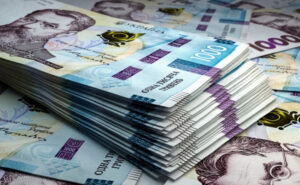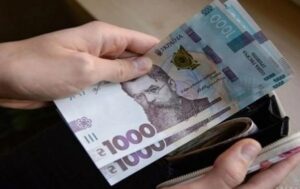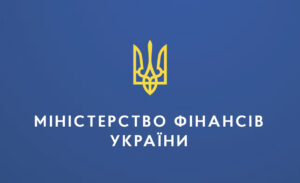
Actual revenues to the general fund of the state budget from taxes and fees controlled by the State Tax Service of Ukraine (STS) amounted to UAH 1 trillion 246 billion in January-December 2025, which is 20.2% or UAH 209.3 billion more than last year, according to a publication on the institution’s website.
According to the STS, despite an increase in planned indicators during the year by more than UAH 100 billion, the annual revenue plan was fulfilled by 97.4%.
According to the acting head of the State Tax Service, Lesya Karnaukh, quoted in the report, the stable over-fulfillment of targets during the first half of the year created the necessary financial reserve, which made it possible to avoid significant shortfalls at the end of the year.
It is noted that in the structure of the main sources of budget revenues for the 12 months of 2025, the largest share was provided by personal income tax and fees, which amounted to UAH 362.9 billion. Value added tax (including budget refunds) brought UAH 306.5 billion to the budget, and corporate income tax brought UAH 284.7 billion. In addition, excise tax revenues amounted to UAH 163.9 billion, while rent payments provided UAH 48.4 billion.
Karnaukh separately highlighted the dynamics of VAT budget refunds, which totaled UAH 179.6 billion for the year. At the same time, the monthly refund rate during the year was not less than UAH 13 billion.
“Today, businesses have to reorient significant financial resources and invest in recovery and relocation. I am grateful to everyone who does not give up,” said the acting head of the State Tax Service.
She also added that the achievement of these indicators in the context of war, shelling, and energy challenges is the result of the responsibility of each taxpayer.

On January 1, 2026, Bulgaria will adopt the single European currency, the euro.
“This is a historic step for the country and a boon for individuals and businesses in the euro area. The transition will lead to greater economic stability, smoother transactions, and stronger European integration. For Bulgaria, adopting the euro will help to better support long-term economic growth and strengthen its resilience,” according to a statement on the European Central Bank’s website.
The publication notes that “the changes may raise questions and concerns.” “However, the ECB and national authorities are working closely together to ensure a smooth transition for everyone through careful planning and a focus on price stability,” the European Central Bank assures.
Bulgaria is parting with its national currency, the lev, 19 years after joining the European Union. The press in the veteran eurozone countries points out that this will be convenient for tourists and travelers. However, there are concerns in Bulgaria itself, as the ECB acknowledges.
Expectations of benefits are overshadowed by concerns about possible price increases, as seen in Croatia, which joined the eurozone three years ago. These fears are all the more serious given that Bulgaria is one of the poorest countries in the EU.
Nevertheless, the European Commission (EC) considered that this Balkan country, which is becoming the 21st member of the eurozone, has met the relevant criteria: economic stability, public debt below 60% of GDP, and low inflation.
On June 4, 2025, the EC announced its conclusion that Bulgaria was ready to switch to the euro on January 1, 2026.
“Thanks to the euro, Bulgaria’s economy will become stronger, with more trade with eurozone partners, foreign direct investment, access to finance, quality jobs, and real incomes. And Bulgaria will take its rightful place in decision-making within the eurozone,” said EC President Ursula von der Leyen on this occasion.
The EU Council, in turn, announced on July 8, 2025, the approval of the last three legal acts necessary for the introduction of the euro in Bulgaria on January 1, 2026.
“This marks the culmination of a thorough accession process for Bulgaria, which has involved rigorous analysis and intensive preparation,” said Danish Economy Minister Stephanie Lose, who was chairing the EU Council at the time.
“One of the three legal acts sets the exchange rate between the euro and the Bulgarian lev at 1.95583 levs per euro. This corresponds to the current central rate of the lev in the Exchange Rate Mechanism II,” the EU Council said in a statement.
After Bulgaria joins the eurozone, six countries will remain in the EU that do not use this currency: Hungary, Denmark, Poland, Romania, the Czech Republic, and Sweden.
The European Monetary Union, or eurozone, began operating on January 1, 1999, when the single European currency, the euro, was introduced into non-cash circulation. Since March 1, 2002, the euro has been the sole legal tender in the eurozone. Eurozone countries transfer all monetary policy powers to the ECB, including decisions on the amount of money supply and the key interest rate.

In Ukraine, from January 1, 2026, the minimum wage has increased to 8,647 hryvnia.
In particular, according to the law “On the State Budget for 2026,” which came into force on January 1, the minimum wage has increased from 8,000 to 8,647 hryvnia, and the hourly minimum wage has increased from 48 to 52 hryvnia.
Also, from January 1, the general subsistence minimum increased from UAH 2,920 to UAH 3,209.
For children under six years of age, the subsistence minimum is now UAH 2,817, for children from six to eighteen years of age – UAH 3,512, for able-bodied persons – UAH 3,328, for persons who have lost their ability to work – UAH 2,595, and for persons who have lost their ability to work, which is used to determine the amount of additional payment for living in areas of radioactive contamination according to court decisions, it is UAH 1,600.
It has also been established that the subsistence minimum for able-bodied persons, which is used to determine the base salary of judges, district prosecutors, and employees of other state bodies whose remuneration is regulated by special laws, as well as employees of tax and customs authorities, is set at the level established for the relevant state body as of December 31, 2025.
In addition, the document stipulates that in 2026, the level of the subsistence minimum for the purpose of granting assistance in accordance with the Law “On State Social Assistance to Low-Income Families” as a percentage of the subsistence minimum for the main social and demographic groups of the population shall be: for able-bodied persons – 60%; for persons who have lost their ability to work and persons with disabilities – 100%; for children – 145% of the corresponding subsistence minimum.
At the same time, the subsistence minimum level for determining the right to exemption from payment for a child’s meals in state and municipal preschool education institutions in accordance with the Law “On Preschool Education” will not increase in 2026.

Travelers paid 338.4 million hryvnia in tourist tax for January-November 2025, which is 35.4%, or 88.4 million hryvnia, more than in the same period of 2024, according to the State Tax Service of Ukraine (STS).
According to data published on the agency’s website, Kyiv and Lviv region remain the most visited tourist destinations among the regions, together receiving almost 40% of the total amount of tax: Kyiv provided 68.8 million hryvnia in revenue, and Lviv region provided 61.6 million hryvnia.
A significant portion of the tax also came from the Ivano-Frankivsk region (UAH 45.6 million) and the Zakarpattia region (UAH 30.4 million).
“The holiday season is the peak load on the infrastructure of cities and communities. The tourist tax is an important source of revenue for local budgets, with funds directed towards the development of tourist infrastructure, improvement of territories, support for cultural and festive events, and improvement of services for visitors to the regions,” the State Tax Service noted.
The State Tax Service reminded that the tourist tax is paid by Ukrainian citizens, foreigners, and stateless persons as an advance payment before temporary accommodation in places of residence.
Tax agents are business entities that provide temporary accommodation services (hotels, hostels, holiday homes, etc.), and they transfer the collected funds to the local budget. The list of such agents is published on the websites of local councils.
The rates of the tax are set by local councils for each day of stay at up to 0.5% of the minimum wage for Ukrainian citizens and up to 5% for foreigners.
Persons/children with disabilities, persons/children accompanying persons with disabilities of group I, and war veterans are exempt from paying the tourist tax.

On January 1, 2026, Ukraine joined the EU’s single roaming zone Roam like at home: subscribers can call, send SMS messages, and use mobile internet in 27 EU countries at Ukrainian rates — without “international rates,” according to Suspilne.
Similarly, subscribers from EU countries traveling to Ukraine will retain their home rates.
Roam like at home is the EU’s internal market regime for mobile communications. It allows you to use calls, SMS, and mobile internet abroad without roaming surcharges.
As for the internet, the pan-European Fair Use Policy applies. If your tariff in Ukraine includes 20 GB or unlimited data, this does not mean that all these gigabytes will be available in the EU for free. Operators calculate the volume using a special EU formula linked to the cost of your tariff, explains Suspilne.
“Welcome Moldova and Ukraine to the EU zone without roaming! From today, you can ”roam like at home” because we are preparing a home for you in the European Union. The benefits of our Union bring Europeans closer together across the continent – also on the eve of EU accession,” wrote European Commissioner for EU Enlargement Marta Kos in H.
Back in June last year, as reported by Deputy Prime Minister for Innovation, Education, Science and Technology Development, Minister of Digital Transformation Mykhailo Fedorov, the European Commission sent a proposal to the EU Council to join Ukraine to the Roam like at Home policy from January 1, 2026. The EU Council approved this proposal. In early June, President Volodymyr Zelensky signed Bill No. 12150, which is the final requirement for Ukraine to join the single European roaming area Roam like at home (RLAH).
Since 2022, Ukrainians in Europe have been able to use the tariffs of Ukrainian mobile operators without additional roaming charges, thanks to temporary joint agreements between operators in Ukraine and the EU.
Fedorov himself emphasized on Thursday: “Ukraine is a full member of the European Roam Like at Home policy. Domestic tariffs for Ukrainians in Europe will be standard practice — previously, these were agreements with European operators.”
Roam Like at Home is an opportunity for Ukrainians who are temporarily traveling or staying in EU countries to make calls and use the internet at their operator’s tariffs without any additional charges, Fedorov wrote on Telegram.
“We became the first candidate country to join Roam Like at Home even before joining the EU. Use your operator’s tariffs in Europe without changing your SIM card,” he said.

The Ukrainian state budget for 2025 allocates UAH 14.5 billion for science funding, while the draft (adopted) state budget for 2026 sets this figure at UAH 20.1 billion, according to materials from the Ukrainian Ministry of Finance.
In the Ministry of Finance’s presentation on the 2026 budget, 3.2 billion hryvnia is earmarked for supporting science on a performance basis, 1 billion hryvnia for creating scientific centers for defense developments, and 0.7 billion hryvnia for projects by young scientists.
At the same time, the latest available official summary statistics on internal expenditures for research and development (R&D) refer to 2024: they amounted to UAH 28.328 billion, which is 32.7% more than a year earlier; R&D intensity (share of GDP) increased to 0.37% from 0.30% in 2023.
According to the summary review, in 2024, 616 organizations were engaged in research and development, and the number of personnel employed in R&D was 63,800.
In terms of the structure of R&D funding in 2024, 30.6% came from the organizations’ own funds, 40.8% from the public sector (including 38.5% from the state budget), 11.6% from the business sector, and 15.9% from foreign sources.
By sector, the business sector accounted for 59.9% of domestic R&D expenditure, the public sector for 33.4%, and the higher education sector for 6.7%.
Ukrainian legislation sets a benchmark whereby the state provides budgetary funding for scientific and scientific-technical activities in the amount of at least 1.7% of GDP.
Compared to the EU, Ukraine’s R&D indicators remain low: according to Eurostat estimates, in 2024 the European Union spent €403.1 billion on R&D, and R&D intensity amounted to 2.2% of GDP (unchanged from the previous year).
The “domestic R&D expenditure” indicator reflects the total expenditure on research and development within the country from all sources. The “funding for science in the state budget” indicators are a narrower snapshot and are not equal to total domestic R&D expenditure.
https://expertsclub.eu/ukrayina-v-2026-r-planuye-201-mlrd-grn-na-nauku/